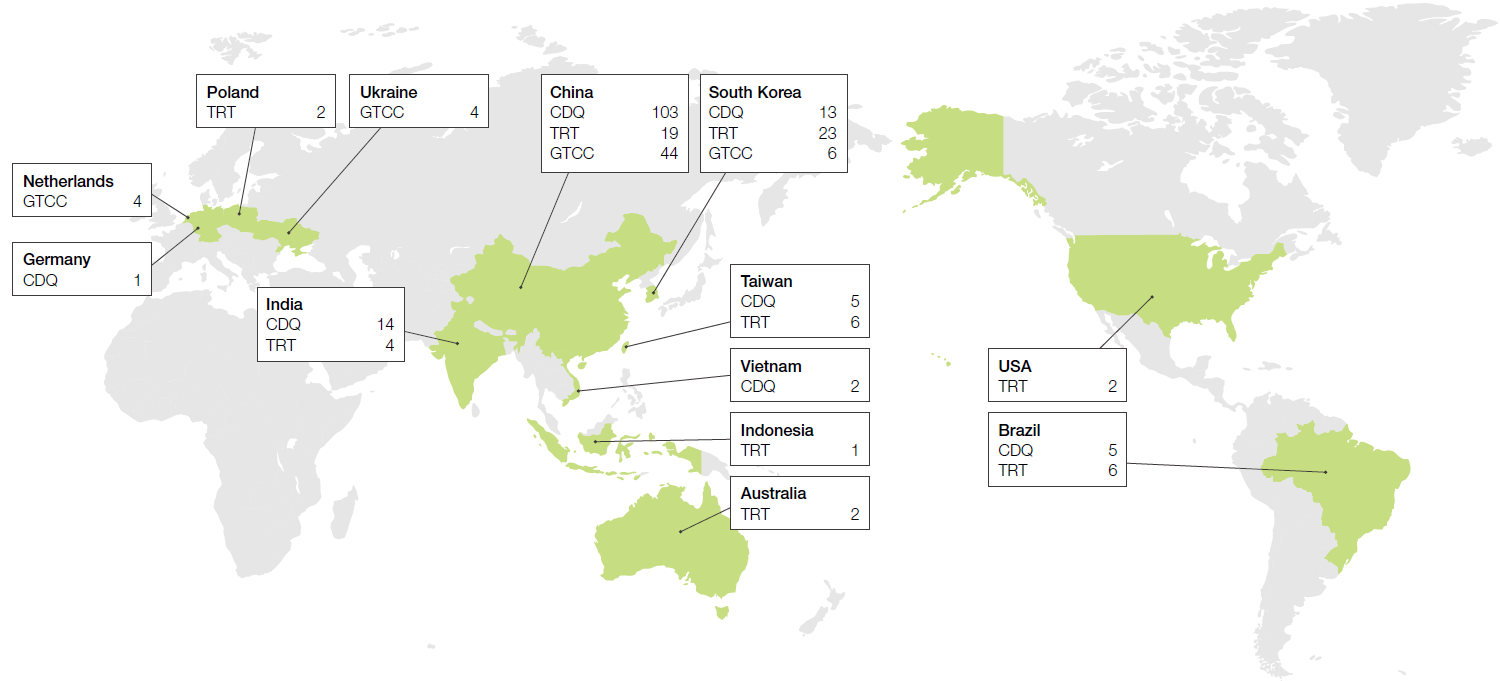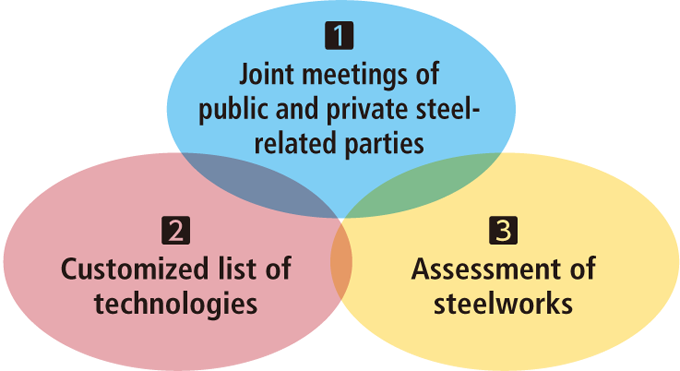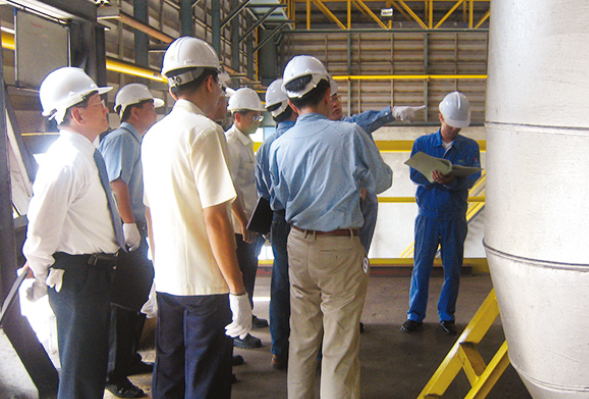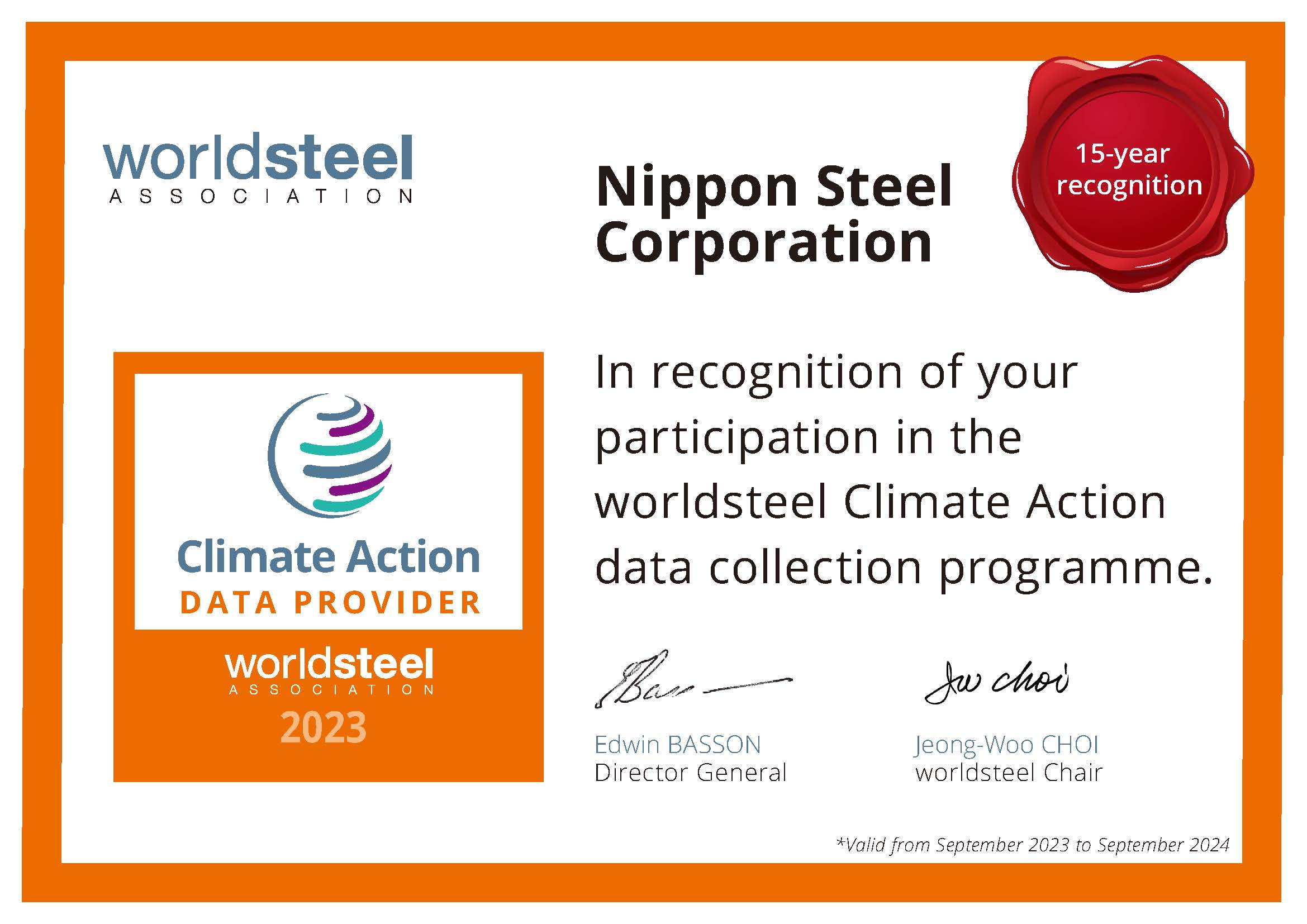Activities to transfer and diffuse decarbonization technologies overseas ECO SOLUTION
Contribute to reduction of CO2 emission on a worldwide scale
With the understanding that the transfer of Japan’s advanced energy-saving technologies overseas can be effective ways to globally reduce CO2 emissions, Nippon Steel is participating in many energy-saving and environmental initiatives in Japan and overseas. For example, we work with the World Steel Association and directly with countries such as China and India.
Japan’s steel industry can contribute to the reduction of CO2 emissions on a worldwide scale by transferring its advanced energysaving technologies to emerging countries. The reduction effects of CO2 emission by transfer of Japanese steelmakers’ energy-saving technologies have amounted to 77.67 million tons of reduction in CO2 emissions per year in total.
(10,000 t-CO2/year)
| Number of units |
CO2emission reduction | |
| CDQ*1 | 143 | 3,044 |
|---|---|---|
| GTCC*2 | 58 | 2,545 |
| TRT*3 | 65 | 1,170 |
| Oxygen Converter Gas collection | 22 | 821 |
| Heat recovery | 7 | 98 |
| Oxygen Converter Gas waste heat collection | 8 | 90 |
| Total | 303 | 7,767 |
(FY2022)
1 All CDQ units were installed by the Nippon Steel Group (such as Nippon Steel Engineering).
2 GTCC: Highly efficient GTCC power generation
3 TRT: Top Pressure Recovery Turbine
Japanese steel industry’s energy-saving technologies are spreading globally (units installed in numbers)
*If you are viewing this document on a smartphone, enlarge the figure and use it.

Japan’s steel industry’s nternational cooperation in energy conservation
As a core member of the Japan Iron and Steel Federation (JISF), Nippon Steel is involved in multinational projects such as those for the Environment Committee of the World Steel Association. In addition, the JISF is promoting 1) joint meetings of public and private steel-related parties, 2) preparation of customized list of technologies, and 3) assessment of steelworks as to energy-saving status. These are the three pillars of collaboration for bilateral energy-saving and environmental cooperation with India, Southeast Asia, and other countries and regions.
The three pillars of international cooperation in energy conservation

Energy efficiency in steelmaking by country (2019)

Source: International Comparisons of Energy Efficiency (Sectors of Electricity Generation, Iron and steel, Cement), RITE, 2010 (The Japanese translation and numerical values were provided by the Japan Iron and Steel Federation.)
1.Joint meetings of public and private steel-related parties
In public-private steel-related joint meetings, we share the technologies customized list, the results of assessment of steel mills, and introduce detailed technical information and financing schemes, in order to realize the early transfer of energy-saving technologies to emerging countries. By fiscal 2023, joint meetings have been held: 12 times in India and 16 times in six ASEAN countries. In 2023, we held the “2023 Public and Private Collaborative Meeting between Indian and Japanese Iron and Steel Industry” with India and the online “ASEAN-JAPAN Steel Initiative Webinar 2024 - Pathways to Carbon Neutrality” conference with ASEAN countries and shared policies and private sector initiatives aimed at achieving carbon neutrality.
2.The technologies customized list
We identify the appropriate technologies for each country and region, and in addition to detailed technical information, we conduct the assessment of steel mills, and provide the technologies customized list, which complies with information such as on suppliers, for reference. For the ASEAN countries the 4.1 version on blast furnace (BF) steelmaking and 4.0 version on electric arc furnace (EAF) steelmaking of the technologies customized list have been released while, for India, the list was updated into the 5.1 version on BF steelmaking and the 5.0 version on EAF steelmaking in fiscal 2023.

The technologies customized list
3.Assessment of steelworks
Experts from the Japanese steel industry visit the steel mills overseas to propose energy-saving technologies, provide operational improvement advice based on the operational conditions of the facilities, and conduct the energy-saving assessment of steel mills using the international standard ISO14404. Up to fiscal 2023, we had carried out the assessment of 14 steel mills in India and 17 mills in six ASEAN countries.

Assessment of steelworks
Activities as a Climate Action member
Nippon Steel participates in the Climate Action Program of the World Steel Association, which uses universal methods to calculate and report on the CO2 emitted by steelworks. As a Climate Action member (data provider), our 17 years of contribution have been highly recognized.

Climate Action DATA PROVIDER certificate
